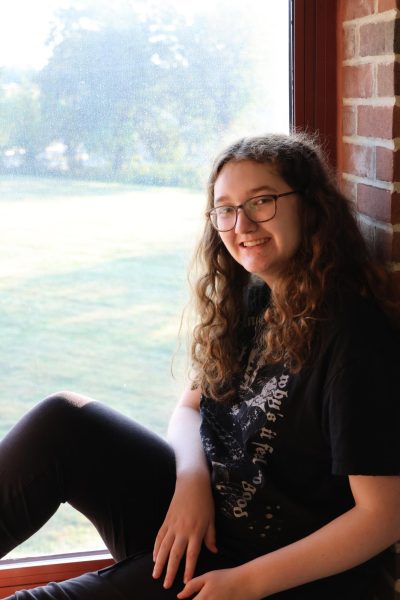Neither Aida Armstrong (10th grade) nor Viraaj Randhawav (12th grade) had heard of National History Day before they came to CHS. Both are here through the War College, Armstrong having last been in Washington state and Randhawav in India. Neither were big fans of history, and only participated in the competition due to it being a requirement for APUSH. Yet, they both made it to Nationals.
This years’ theme was Rights & Responsibilities. Despite having very different topics, Armstrong and Randhawav both focused on the media’s response and how it shaped people’s perception of the event they covered.
Armstrong first came across her topic of Gertrude Ederle, the first woman to swim the English Channel, when she watched a movie about her life titled Young Woman and the Sea. Aida, who has been swimming for nine years and is interested in feminism, thought that the topic tied together both of her interests perfectly and therefore pursued it.
On the other hand, Randhawav was actively searching for an event that had to do with student activism. At first, he wanted to focus on Indian history, but decided to instead focus on Pennsylvania’s. This is how he found out about the 1967 Philadelphia school walkout, in which African American students protested for better rights and, in turn, were attacked by police.
One question that was asked of both students was whether their perception of their topic changed over time. Armstrong’s view changed on the topic in that it was much more heavily covered in the media than she first expected. Randhawav said that learning the details of his topic made him realize how the event was even more terrible than it seemed at first glance.
Another important part of History Day is being interviewed by judges. When asked how she prepared for this step, Armstrong said she “branched out in every direction [her] topic [could] go,” looking from Ederle and her friends to the history and state of women’s rights now. This helped her to answer their questions, such as when the 19th Amendment was passed. She was very grateful to the judges for being so interested in her topic.
Back in India, Randhawav enjoyed competing in speech and debate competitions, which helped prepare him to speak with the judges. He also said that he grew more confident over time, especially when judges would ask repeat questions from past stages, letting him refine and improve his answers.
Next year, Armstrong will be moving to Georgia and Randhawav will be moving back to India. Nevertheless, History Day has left an indelible mark on both. Armstrong started this school year by thinking that history was just “wars and Americanism,” which Randhawav also echoed, stating “it was a subject…that [he] wanted to get out of as quickly as possible.”
However, after spending so much time researching topics they were interested in, their views changed. “There is a side to history for every single person,” Armstrong stated, “It’s been very inspiring to learn that.” Randhawav said that it’s given him more critical thinking and that it “gave [him] that confidence to start [researching],” something he’s going to take back to India, where he would like to look into some of the country’s minor historical events. As only one-third of people realize that history is more than just dates and names, to hear students learn about the importance and fun of such an essential subject is refreshing.
Both students were asked what their favorite fact was or what they took away from the project. Armstrong had a favorite quote which was written by “a news reporter from the Evening Star,” which stated that “the female masters of today swim distances and establish records which seemed unachievable to the male masters of yesterday.” Armstrong felt that this was perfect for her project as “[Ederle] inspired that change and [the reporter] captured that whole shift in mindset that the world had.”
Randhawav said that the message he took away from his project was the importance of student activism, stating that it “is something that should happen more” and that he “[doesn’t] want people to forget that just because students cannot vote, doesn’t mean that they’re not thinking about politics.” He ended by saying that “your opinions should not be shut down because you cannot vote. That should not be something that [happens] in any country’s politics.”
National History Day is a great program that helps students learn the importance of history. Unfortunately, it recently lost much of its funding while President Trump’s administration has been looking for ways to reduce spending. Nevertheless, the organization has reached out asking for donations, and many people have already given, hoping to continue the 51-year-old program’s tradition of teaching students to love history.
Overall, history is an overlooked subject that is incredibly important; it is critical for everyone to recognize this. Our present and future are dictated by our history, and not recognizing this essential fact only leads to ignorance and danger. We must learn history and provide students with ways to connect to it, or we will be condemned to repeat it.





























































































